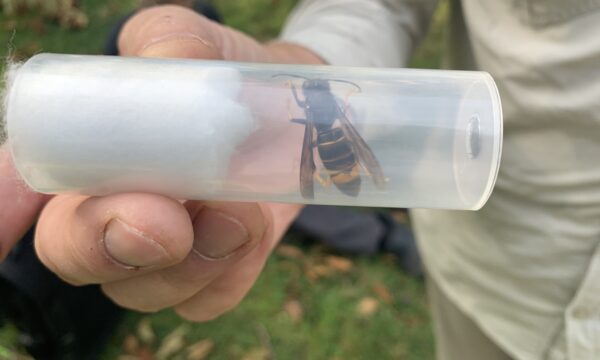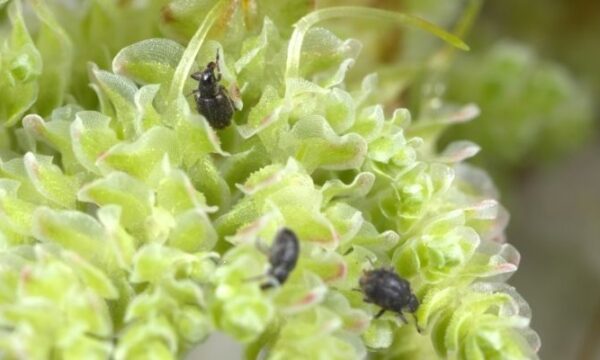Since 2009, I have worked with the Global Commission on Biological Control and Access & Benefit Sharing of the International Organisation for Biological Control to raise awareness of the issues relating to biological control which may be affected under the Convention on Biological Diversity’s access and benefit sharing protocol which was finally agreed at COP10 in Nagoya, Japan, in October last year1.
The IOBC Commission attended various background meetings, produced a report for the Global Commission on Genetic Resources for Food and Agriculture2, followed by a Forum Paper in the journal BioControl3 and various news items culminating in a World View page in Nature4 the month before the Nagoya meeting. Basically, we put the case that biological control is a public good, that countries that supply biological control agents are also importers of biological control agents, that the best way forward would be to continue the 100+ years history of free multi-lateral exchange of biological control agents between countries as non-commercial research under any future access and benefit sharing protocol, and that benefit-sharing should be based on shared research activities.
The Nagoya protocol is an agreement between the countries of the CBD as to how access and benefit sharing of genetic resources (including all biological control agents) will be handled in future. Based on this protocol, each country will prepare its own legislation and regulations. Article 8 ‘Special Considerations’ of the Nagoya Protocol states:
In the development and implementation of its access and benefit-sharing legislation or regulatory requirements, each Party shall:
(a) Create conditions to promote and encourage research which contributes to the conservation and sustainable use of biological diversity, particularly in developing countries,’ including through simplified measures on access for non-commercial research purposes, taking into account the need to address a change of intent for such research;
(b) Pay due regard to cases of present or imminent emergencies that threaten or damage human, animal or plant health, as determined nationally or internationally. Parties may take into consideration the need for expeditious access to genetic resources and expeditious fair and equitable sharing of benefits arising out of the use of such genetic resources, including access to affordable treatments by those in need, especially in developing countries;
(c) Consider the importance of genetic resources for food and agriculture and their special role for food security.
So, if it is accepted that biological control is non-commercial research, simplified measures for access and benefit sharing should facilitate biological control research. Furthermore, the use of biological control to address emergencies and the needs of food and agriculture, should also be facilitated by national implementation of the Nagoya protocol. Short of a specific positive mention of biological control, this is as much as we hoped for.
However, in practice, a lot will depend on the actual national legislation and regulations put in place by each country, and there is still a risk that if biological control is not considered in this process, some countries may inadvertently make it unnecessarily difficult or impossible to access biological control agents. Nevertheless, the biological control community is asking countries to trust them with access to biological control agents, and so it will be important that those involved in the search for biological control agents make every effort to follow national legislation and if none is in place, the spirit of the Nagoya protocol.
Matthew J.W. Cock
CABI Chief Scientist
[2] Cock, M.J.W.; van Lenteren, J.C.; Brodeur, J.; Barratt, B.I.P.; Bigler, F.; Bolckmans, K.; Cônsoli, F.L.; Haas, F.; Mason, P.G.; Parra, J.R.P. (2009) The use and exchange of biological control agents for food and agriculture. Background Study Paper No. 47. Commission on Genetic Resources for Food and Agriculture, FAO, Rome, 88 pp.
[3] Cock, M.J.W.; van Lenteren, J.C.; Brodeur, J.; Barratt, B.I.P.; Bigler, F.; Bolckmans, K.; Cônsoli, F.L.; Haas, F.; Mason, P.G.; Parra, J.R.P. (2010) Do new Access and Benefit Sharing procedures under the Convention on Biological Diversity threaten the future of biological control? BioControl 55, 199-218. (Published on-line 2009).
[4] Cock, M. (2010) World View: Anti-biopiracy rules should not block biological control. Nature 467 (23 September 2010), 369.
Related News & Blogs
Training on mass production of entomopathogenic nematodes for biological control of invasive insect pests
A team of global experts in the production of biocontrol agent provided a practical training on the mass culture of entomopathogenic nematodes at the Biocontrol Agent Facility of Rwanda Agriculture and Animal Resource Development Board (RAB), writes Dr…
20 December 2023





